Home › Activities › City in Focus Project
City in Focus Project
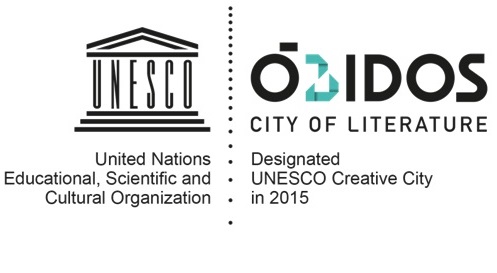
Óbidos UNESCO City of Literature
Once the wedding present to a Queen, the preserved medieval town of Óbidos, located 80 km north of Lisbon is without doubt one of Portugal’s most interesting walled settlements. When strolling along the maze of narrow cobbed streets of Óbidos, at each step, one comes upon vestiges of different civilizations. Óbidos is today one of the main jewels of the country.
For the past decade, Óbidos has been implementing a development strategy focused on Tourism, Culture and Economy. The Town Council has organized a number of initiatives that have attracted the attention to this historic town. These events embrace a number of different areas that include: content production, set design, entertainment and acting, music, graphic design, marketing and advertising, multimedia, artistic creation and cultural research.Creative management of historic centres is only possible when stop throwing around words like “creativity” and “innovation” and ensure an effective creative impact, that is sustainable and looks to the future. Óbidos has done that. Today, this town is considered an example in what concerns the implementation of a Literary Strategy.
Obidos organised all year round events that bring together writers, editors, teachers, students, that culminate in two major events, Latitutes and FOLIO. Óbidos, as a City of Literature, intends to be a place of gathering, writing, reading, storytelling and where all is driven by the essence of literature.
Óbidos is a small town in the centre of Portugal. Because it does not have a significant local literary heritage, it became, from the beginning, a Literary Village of Portugal, promoting the Portuguese speaking literary creations and accomplishments. This is how this town is recognized by the Portuguese in general and by the field of culture in particular. For this reason, programming is very much the result of what cultural institutions, publishers and institutes bring to Óbidos. Óbidos is a privileged space for exhibition and cultural dissemination and as a laboratory for creating shows, exhibitions, workshops, courses that are created for Óbidos and then circulate throughout the country.
Óbidos is currently working with other creative cities, specifically, Granada (Spain), Idanha-a-Nova (Portugal), Paraty (Brazil) and Santos (Brazil).
Óbidos Vila Literária project
The beginning of the Óbidos Vila Literária project in 2011 had the purpose of paving the way for the regeneration of a historical center, whose strength was more than proven after a decade of economic revitalization through a collection of events, some more popular as the medieval market, and others more erudite such as the Opera Festival. This experimentation had such a strong acceptance, making this town a powerful media giant with a dizzying ability to mobilize.
A few years ago, due to the need to rehabilitate some buildings and public spaces, funding opportunities were sought, especially for the rehabilitation of an old church located within the walls. The national context was that of a country with no funding programs for conservation and heritage, so it was necessary to find solutions that aimed at a cultural and economic dimension of the area while respecting the history of the building. The strategy was to create a cultural and literary center in Óbidos. When, in 2012, we opened the largest Portuguese bookstore in a church, we drew attention to the new configurations between spaces and activities and between local and foreign talents. We started with the idea of building a physical network of bookstores, which skyrocketed to 11 new bookstores in less than five years, including a literary hotel. This project has brought a very interesting positioning to Óbidos, not only for its cultural relevance, but also for tourism differentiation.
On December 11th, 2015 UNESCO considered Óbidos a Literary City, as part of the Creative Cities Network program. Created in 2004, this network aims to „promote cooperation with and between cities that have identified creativity as a strategic factor for urban development.“ Óbidos' candidacy for UNESCO's network of literary cities was based, among other factors, on the Literary Village project that had been in development in Óbidos since 2011 as result of a partnership between the municipality and José Pinho, from LerDevagar Association. Óbidos entered the UNESCO list alongside other literary cities such as Barcelona, Edinburgh, Melbourne, Iowa City, Dublin, Krakow (Poland), Heidelberg (Germany), Dunedin (New Zealand), Granada (Spain) and Prague (Czech Republic).
Óbidos Vila Literária is a unique project in the context of the artistic and cultural manifestations that take place in Portugal. The quality of this literary and artistic project is recognized by the local, regional, national and international community, both the public and its peers at local and global level: UNESCO Creativity Cities Network, IOB-International Organisationod Booktowns and International Literary Events.
The Literary Village of Óbidos was built on the assumption that there would be a Network of Bookstores equipped with specific spaces for the organization of art exhibitions, concerts, conferences and performances. In addition to the spaces related to the books, Vila Literária has a number of municipal spaces: museums, galleries and artistic and literary residences that allowed us to complete the offer and meet the requests of writers, authors and artists looking for Óbidos as a place where they can develop their projects or present them. The activities of Óbidos Vila Literária are ongoing throughout the year, with manifestations of greater importance in the festivals and literary and artistic gatherings, namely in FOLIO – International Literary Festival (in its diverse and artistically comprehensible components: Authors, Illustrates, Educates, Folia, and Parallel) and in Latitudes – Literature and Travel.
Óbidos Vila Literária plays a crucial role in the social cohesion of the territory involving the residents of the municipality and of the Western region, extending even to other municipalities and neighboring regions. The plan of activities has a main concern related with social inclusion, integration and collaboration with schools, polytechnics and universities, students, teachers and researchers. This plan, that starts from the book and reading, has a holistic and integrative concern covering the different areas of knowledge and the Arts.
Óbidos is, at the moment and as a whole, a Literary City, as it encompasses literature in everything it does, from the reconstruction and reuse of old buildings to the creation of jobs, thinking of alternative tourism products.
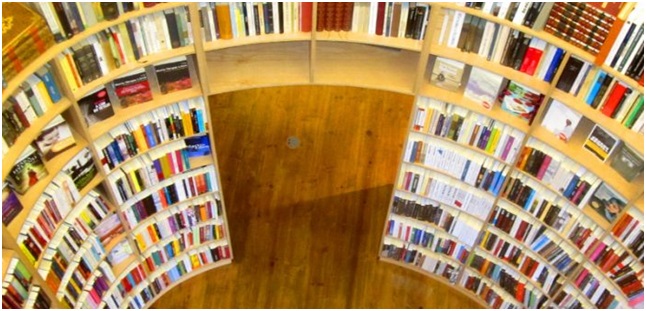
Santiago Bookstore
The Church of Santiago, a temple originating in the 12th century and one of the most emblematic buildings in the town, is now the Bookstore of Santiago. Located within the castle walls, in the Old Arms Square, next to the entrance of the castle, it is a space where visitors can find a great variety of books, film projection, debates, book launches and exhibitions or simply to have some tea or a coffee.
This is an example of urban rehabilitation and heritage through concepts of creativity and innovation, in this case linked to literature and books, making us believe in the development and preservation of areas of low population density through unconventional concepts.
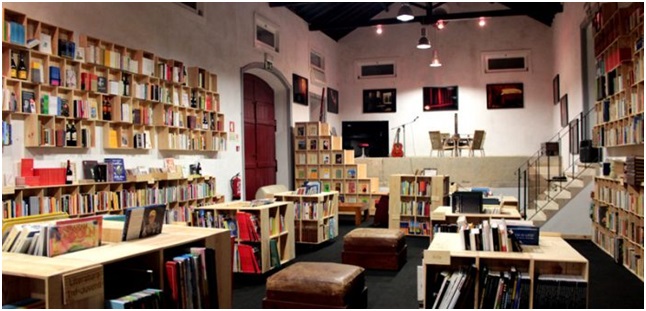
Wine Cellar Bookstore
Espaço Ó is a building restored by the Municipality of Óbidos and equipped with workspaces that can be rented by the month, the week, the day or the hour, depending on the specific needs of the intereseted parties presenting a concept of alternative work, in which all the participants contribute with ideas and solutions for the development of projects – 'CoLab' (collaboration laboratory). In this space you can find a generalist bookstore and alfarrabista, as well as a wine bar and snacks.
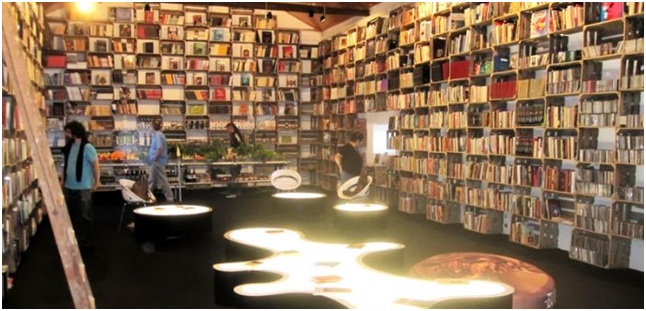
Organic Market and Booskshop
Óbidos Biological Market and Bookshop operates in Rua Direita, in a former fire station. Here you can find several organic products of the region. In this space you can find rare books on Travel, Gastronomy and Wines.
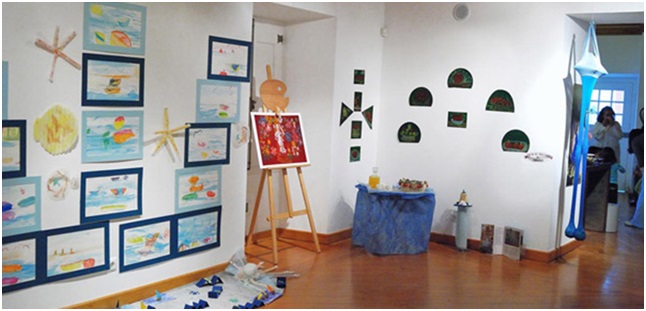
Pelourinho Gallery
Inaugurated in 2004, this space is destined to organize events of cultural relevance, namely exhibitions of Contemporary Art, promoting and stimulating the practice and the new talents that are being established in the national artistic panorama. In this space you can find books about poetry and Fernando Pessoa.
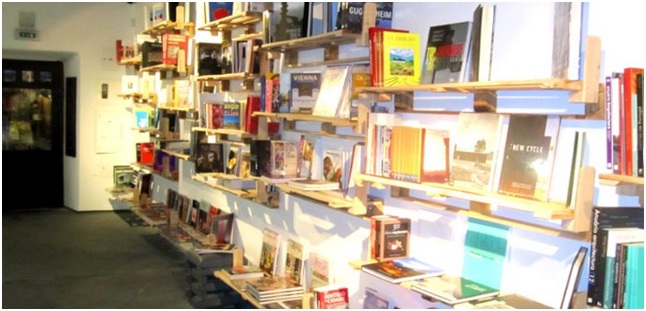
Gallery NovaOgiva
Known as the Ogiva Gallery, this space was created in Óbidos, in 1970. The Gallery is today a milestone in the History of Art, Architecture and the history of the town and is the starting point for exhibitions and other events or cultural expressions associated with contemporary artistic expressions. In this space visitors find a bookstore, exhibitions, projections and performances.
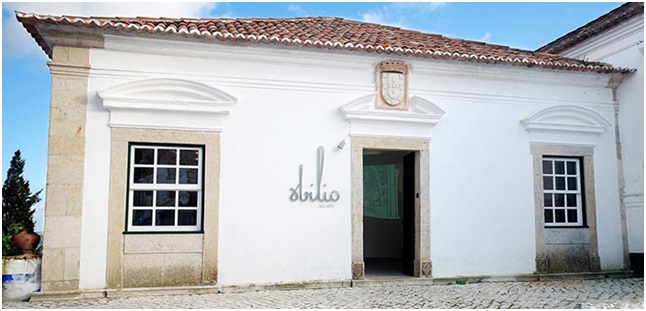
Abílio Museum
The Abílio de Mattos e Silva Museum was impulsionated by Maria José Salavisa more than fifteen years ago. Abilio de Mattos e Silva was a painter, set designer and costume designer, born in Sardoal in 1908, and died in 1985. Although not originally from Obidos, this was his land of choice, where he was raised and where he kept a residence with his wife, the architect Maria José Salavisa. Although he turned out to be a promising artist in the Visual Arts, he ended up dedicating himself to a creative activity full of great vitality, linked to theater and opera. In this space, you can find books about Illustration, Heritage and Old Book.
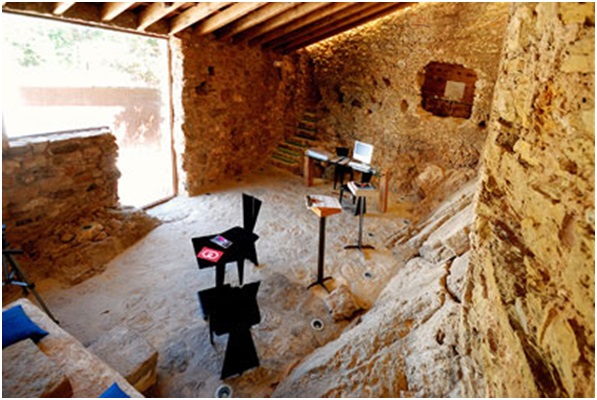
Interior Design Centre
The Interior Design Center, located next to the Facho Tower, aims to contribute to the development of design, promoting exhibitions, seminars, conferences and meetings related to the area, seeking to an approach between creators and the public. In this space you can find books on Homes and Interior Design.
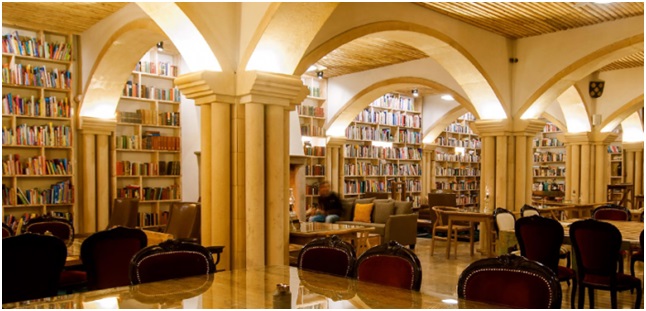
Literary Man Hotel
Recently the Estalagem do Convento, in Óbidos, was converted into a themed hotel, The Literary Man. It presents a new thematically specialized literary offer with international collections in excellent conditions – Best-Sellers, Children's Illustration, Old Books, Coffee-Table Books and collections editorials of Penguin Books, Pan books and Pelican Books. This collection currently corresponds to 40,000 books.
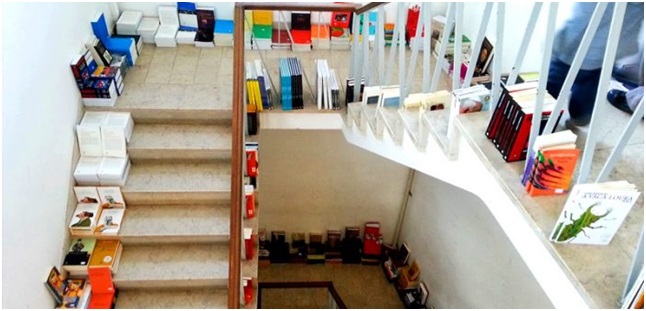
Post Office Building
The former Solar de Aboins is located in the North wing of Praça de Santa Maria. It’s a Mannerist building from 1748, rebuilt by King Dom João V for the nobleman Aboim. Since 1956, the local post office has been operating here. Of its architectural traits, the great central portico that supports the stone of arms of the village of Óbidos stands out. In this space you can find a Gallery and Bookstore.
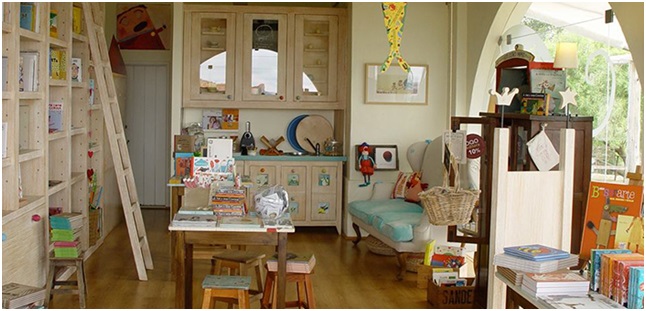
Histórias com Bicho
Built in the context of the centennial plan carried out by the Estado Novo between the 1940s and 1960s, the „Bichinho de Conto“ – a literary project designed to welcome readers from 0 to 200 years old – found its home in an old primary school in Óbidos. In this space you can find Children's books.
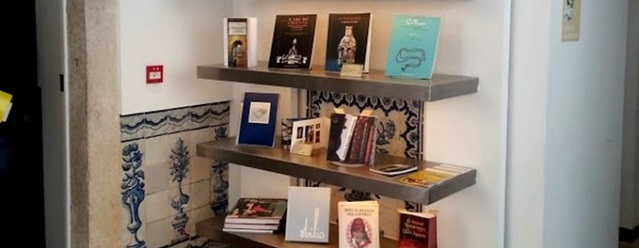
Municipal Museum
The Museum was inaugurated on June 15, 1970, with the presence of the President of the Republic at that time, Almirante Américo Tomás, the Cardinal Patriarch of Lisbon, Manuel Alves Cerejeira and several government officials. The permanent exhibition of the Municipal Museum represents the artistic production and the religious devotion of the historic town of Óbidos. This collection counts with some of the most renowned names in Portuguese Art. However, it's the collection of 16th and 17th century paintings by André Reinoso and Josefa D'Obidos that stand out. In this space you can find History books.
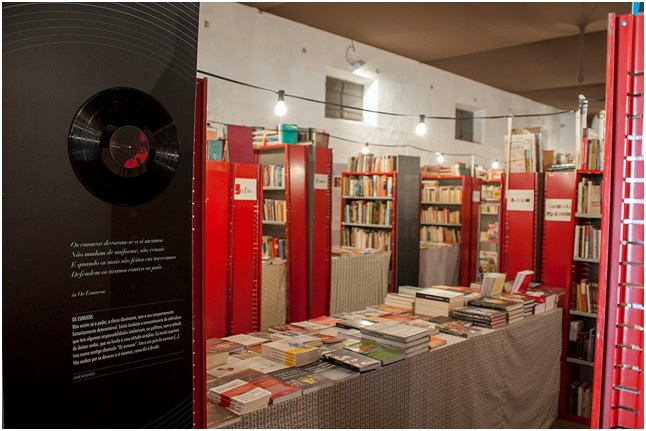
Labirinto Bookstore
In the former warehouses of the EPAC (Public Company of Cereal Supply), the Labirinto Bookstore is the largest bookstore in the village, offering about 60 thousand books purchased by Ler Devagar from bookstores throughout the country that were closed.
Praha město literatury on Facebook
- 2010 © Hlavní město Praha
- Městská knihovna
- Design: Dynamo design
- Realizace: TOVARNA.CZ

